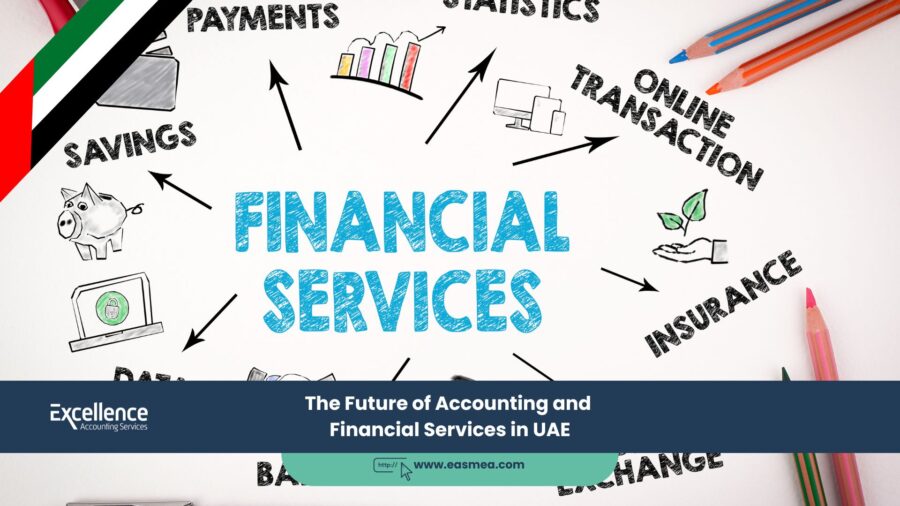The United Arab Emirates (UAE) is rapidly transforming into a global financial hub, driven by its ambitious economic vision and proactive adoption of cutting-edge technologies. This transformation is profoundly impacting the accounting and financial services sector, demanding professionals to adapt and innovate. The “Future of Accounting and Financial Services UAE” is no longer a distant concept but a present reality, characterized by digital disruption, evolving regulations, and a growing emphasis on data-driven decision-making. This blog post aims to provide a comprehensive overview of the key trends shaping this future, exploring the impact of technology, regulatory changes, and the evolving role of financial professionals.
- The Evolving Landscape: Key Trends Shaping the Future of Accounting in UAE
- Regulatory Updates Finance UAE: Navigating Change and Compliance
- The Impact of Technology: AI, Data Analytics, and Blockchain in Finance UAE
- Future Job Prospects in Accounting and Finance in UAE
- The Impact of the UAE Economic Vision 2030 on Financial Services
- What Excellence Accounting Services Can Offer
- FAQ: Navigating the Future of Accounting and Financial Services in UAE
- Conclusion: Embracing the Future of Accounting and Financial Services in UAE
- Ready to Navigate the Future of Finance in the UAE?
We will delve into the specific ways that technologies like Artificial Intelligence (AI), Blockchain, and cloud computing are revolutionizing the industry, and how these changes are affecting businesses and individuals alike. Furthermore, we will examine the regulatory landscape, including VAT implementation and IFRS adoption, and how these factors are shaping the future of accounting practices. By understanding these dynamics, businesses and professionals can position themselves to thrive in the dynamic UAE market.
Key Takeaways:
- Digital Transformation: AI, Blockchain, and cloud computing are reshaping accounting and financial services.
- Regulatory Evolution: VAT, IFRS, and other regulatory updates are demanding adaptability.
- Data-Driven Decisions: Data analytics is becoming crucial for financial insights and strategic planning.
- FinTech Integration: The rise of FinTech is accelerating innovation and efficiency.
- Talent Development: The future requires professionals with strong technological and analytical skills.

The Evolving Landscape: Key Trends Shaping the Future of Accounting in UAE
The UAE’s strategic focus on economic diversification and technological advancement is driving significant changes in the accounting and financial services sector. Key trends include the integration of digital technologies, evolving regulatory frameworks, and a growing demand for specialized financial expertise.
The “Future of accounting UAE” is being significantly shaped by the rapid adoption of digital technologies. Artificial Intelligence (AI) and machine learning are automating routine tasks, improving accuracy, and providing valuable insights through data analysis. Cloud computing is enabling seamless collaboration and remote access, while blockchain technology is enhancing transparency and security in financial transactions. These advancements are not only improving efficiency but also transforming the role of accountants and financial professionals, requiring them to develop new skills and adapt to a more tech-driven environment.
Additionally, the UAE’s regulatory landscape is undergoing continuous evolution to align with international standards and promote transparency. The introduction of Value Added Tax (VAT) and the adoption of International Financial Reporting Standards (IFRS) have significantly impacted accounting practices, requiring businesses to implement robust compliance measures. Furthermore, the UAE government’s commitment to fostering a sustainable and diversified economy, as outlined in the UAE Economic Vision 2030, is influencing financial strategies and investment decisions.
Digital Transformation Accounting UAE: AI, Cloud, and Blockchain
Digital transformation is at the forefront of the “Future of accounting and financial services” in the UAE. AI, cloud computing, and blockchain are revolutionizing traditional processes, enhancing efficiency, and opening up new opportunities for innovation.
AI is automating repetitive tasks, such as data entry and reconciliation, freeing up accountants to focus on more strategic activities. AI-powered analytics tools are also providing valuable insights into financial data, enabling businesses to make informed decisions. Cloud computing is enabling seamless collaboration and remote access, improving efficiency and flexibility. Blockchain technology is enhancing security and transparency in financial transactions, reducing the risk of fraud and errors.
| Technology | Impact on Accounting | Benefits |
|---|---|---|
| AI | Automation of routine tasks, data analysis, predictive analytics | Increased efficiency, accuracy, and data-driven insights. |
| Cloud Computing | Remote access, collaboration, data storage | Improved accessibility, flexibility, and scalability. |
| Blockchain | Secure transactions, transparent records, smart contracts | Enhanced security, transparency, and efficiency. |
FinTech in UAE Accounting: Innovation and Disruption
The rise of FinTech is accelerating innovation and disrupting traditional accounting practices in the UAE. FinTech solutions are streamlining processes, improving efficiency, and enhancing the customer experience.
FinTech companies are developing innovative solutions that are transforming the accounting and financial services sector. These solutions include automated accounting software, mobile payment platforms, and blockchain-based financial services. FinTech is not only improving efficiency but also democratizing access to financial services, making them more accessible to individuals and businesses. This is particularly relevant for SMEs, which often face challenges in accessing traditional financial services.
- FinTech is revolutionizing SME finance in UAE, providing access to innovative lending and payment solutions.
- Digital payment platforms are streamlining transactions and reducing reliance on cash.
- Automated accounting software is simplifying financial management for businesses of all sizes.
Regulatory Updates Finance UAE: Navigating Change and Compliance
The UAE’s regulatory landscape is constantly evolving to align with international standards and promote transparency. This requires accounting and financial professionals to stay abreast of the latest changes and ensure compliance.
Regulatory updates are a crucial aspect of the “Future of financial services UAE”. The introduction of VAT has significantly impacted accounting practices, requiring businesses to implement robust compliance measures. The adoption of IFRS is also driving changes in financial reporting, requiring companies to adhere to international accounting standards. Furthermore, the UAE government is implementing new regulations to combat money laundering and terrorist financing, enhancing the integrity of the financial system.
The Central Bank of the UAE is also playing a vital role in regulating the financial services sector, ensuring stability and promoting innovation. Regulatory sandboxes are being established to provide a controlled environment for FinTech companies to test new products and services. These initiatives are fostering a dynamic and innovative financial ecosystem while maintaining regulatory oversight.
Taxation Changes UAE Accounting: VAT and Beyond
The introduction of VAT has significantly impacted accounting practices in the UAE. Businesses must understand and comply with VAT regulations to avoid penalties and ensure smooth operations.
The implementation of VAT has required businesses to overhaul their accounting systems and processes. This includes implementing robust invoicing systems, maintaining accurate records, and filing VAT returns on time. Accountants must have a thorough understanding of VAT regulations to provide accurate advice to their clients. Furthermore, the UAE government is continuously updating VAT regulations, requiring businesses to stay informed and adapt to changes.
- Step 1: Implement robust VAT-compliant invoicing systems.
- Step 2: Maintain accurate records of all taxable transactions.
- Step 3: File VAT returns on time to avoid penalties.
- Step 4: Stay informed about changes to VAT regulations.
- Step 5: Seek professional advice from qualified accountants.
IFRS Adoption UAE: Best Practices and Challenges
The adoption of IFRS is driving changes in financial reporting, requiring companies to adhere to international accounting standards. This ensures transparency and comparability of financial information.
IFRS adoption is a critical aspect of “Accounting trends UAE”. Companies must implement robust systems and processes to ensure compliance with IFRS. This includes training staff, updating accounting software, and implementing internal controls. Accountants must have a deep understanding of IFRS to provide accurate financial reporting and advice to their clients.
| Aspect | Best Practices | Challenges |
|---|---|---|
| Implementation | Training staff, updating software, implementing controls | Complexity of IFRS standards, resource constraints |
| Reporting | Accurate financial statements, disclosures, compliance | Ensuring consistency, accuracy, and timeliness |
| Audit | Independent audit, compliance with auditing standards | Maintaining independence, objectivity, and professional skepticism |
The Impact of Technology: AI, Data Analytics, and Blockchain in Finance UAE
Technology is transforming the financial services sector in the UAE, enhancing efficiency, improving decision-making, and fostering innovation.
The “AI in finance UAE” is growing, as AI is automating routine tasks, improving accuracy, and providing valuable insights through data analysis. AI-powered analytics tools are enabling businesses to make informed decisions based on real-time data. Blockchain technology is enhancing security and transparency in financial transactions, reducing the risk of fraud and errors. Furthermore, cloud computing is enabling seamless collaboration and remote access, improving efficiency and flexibility.
Data analytics is playing a crucial role in financial decision-making. By analyzing large datasets, businesses can identify trends, patterns, and insights that can inform strategic decisions. This is particularly important in the rapidly changing financial landscape, where businesses need to adapt quickly to new opportunities and challenges.
AI in Finance UAE: Automation and Insights
AI is automating routine tasks, improving accuracy, and providing valuable insights through data analysis. This is transforming the way financial professionals work.
AI is automating tasks such as data entry, reconciliation, and fraud detection. This frees up accountants to focus on more strategic activities, such as financial planning and analysis. AI-powered analytics tools are also providing valuable insights into financial data, enabling businesses to make informed decisions. For example, AI can be used to predict future cash flows, identify potential risks, and optimize investment strategies.
“AI is not just automating tasks; it’s augmenting human intelligence, enabling financial professionals to make more informed and strategic decisions.”
- AI-powered fraud detection systems are significantly reducing financial losses.
- Predictive analytics is helping businesses anticipate market trends and optimize their financial performance.
Blockchain Financial Services UAE: Security and Transparency
Blockchain technology is enhancing security and transparency in financial transactions, reducing the risk of fraud and errors.
Blockchain technology is revolutionizing financial services by providing a secure and transparent platform for transactions. This technology is particularly relevant in the UAE, where the government is actively promoting innovation and adopting cutting-edge technologies. Blockchain can be used for various financial applications, including payments, remittances, and supply chain finance.
- Blockchain is reducing transaction costs and processing times for cross-border payments.
- Smart contracts are automating financial agreements and reducing the risk of disputes.
- Blockchain is enhancing transparency in supply chain finance, improving trust and efficiency.
Future Job Prospects in Accounting and Finance in UAE
The evolving landscape of accounting and financial services in the UAE is creating new job opportunities and requiring professionals to develop new skills.
The demand for professionals with strong technological and analytical skills is growing in the UAE. Accountants and financial professionals must be proficient in using AI-powered tools, analyzing data, and understanding blockchain technology. Furthermore, they must have a deep understanding of the UAE’s regulatory landscape and be able to adapt to changes.
The “Future job prospects in accounting and finance in UAE” are bright for professionals who are willing to embrace technology and adapt to change. The UAE government is investing heavily in education and training to develop a skilled workforce that can meet the demands of the future. This includes providing training in areas such as data analytics, AI, and blockchain.
Required Skills for Future Accountants and Financial Professionals
The future of accounting and finance requires professionals with a diverse skill set, including technological proficiency, analytical abilities, and regulatory knowledge.
Future accountants and financial professionals must be proficient in using AI-powered tools, such as data analytics software and automated accounting systems. They must also have a strong understanding of blockchain technology and its applications in finance. Furthermore, they must be able to analyze data and provide insights that can inform strategic decisions.
- Point 1: Proficiency in AI-powered tools and data analytics.
- Point 2: Understanding of blockchain technology and its applications.
- Point 3: Knowledge of the UAE’s regulatory landscape.
- Point 4: Strong communication and problem-solving skills.
- Point 5: Adaptability and a willingness to learn new technologies.
SME Finance UAE: Opportunities and Challenges
SMEs are a vital part of the UAE’s economy, and they require access to innovative financial services to thrive.
SMEs often face challenges in accessing traditional financial services, such as loans and credit. However, the rise of FinTech is providing new opportunities for SMEs to access innovative financial solutions. This includes peer-to-peer lending platforms, crowdfunding platforms, and automated accounting software.
| Aspect | Opportunities | Challenges |
|---|---|---|
| Access to Finance | FinTech solutions, peer-to-peer lending, crowdfunding | Limited access to traditional bank loans, high interest rates, lack of collateral |
| Financial Management | Automated accounting software, cloud-based solutions | Lack of financial literacy, limited resources, difficulty in managing cash flow |
| Digital Transformation | Adoption of digital payment platforms, e-commerce solutions | Resistance to change, lack of technical expertise, concerns about data security |
The Impact of the UAE Economic Vision 2030 on Financial Services
The UAE Economic Vision 2030 is driving significant changes in the financial services sector, promoting innovation, sustainability, and diversification.
The UAE Economic Vision 2030 aims to transform the UAE into a global hub for innovation and sustainability. This vision is driving significant changes in the financial services sector, promoting the adoption of cutting-edge technologies and fostering a dynamic and innovative financial ecosystem. The government is also investing heavily in infrastructure and education to support the growth of the financial services sector.
The vision also emphasizes the importance of diversifying the economy and reducing reliance on oil. This is driving the development of new financial services, such as Islamic finance and sustainable finance. Furthermore, the government is promoting the growth of SMEs, which are a vital part of the UAE’s economy.
Dubai Financial Sector: Innovation and Growth
Dubai is a leading financial hub in the region, driving innovation and growth in the financial services sector.
Dubai is home to many leading financial institutions and FinTech companies. The Dubai International Financial Centre (DIFC) is a global financial hub that provides a platform for businesses to access capital and expand their operations. The Dubai government is also actively promoting the adoption of cutting-edge technologies, such as AI and blockchain.
Abu Dhabi Accounting Firms: Adapting to Change
Abu Dhabi’s accounting firms are adapting to the changing landscape of the financial services sector, embracing technology and developing new skills.
Accounting firms in Abu Dhabi are adapting to the changing landscape of the financial services sector by embracing technology and developing new skills. They are investing in AI-powered tools, data analytics software, and blockchain technology. Furthermore, they are providing training to their staff to ensure that they have the skills necessary to meet the demands of the future.
“Accounting firms in Abu Dhabi are embracing technology to enhance their services and provide greater value to their clients.”
- Abu Dhabi is becoming a hub for sustainable finance, attracting investments in green projects.
What Excellence Accounting Services Can Offer
Excellence Accounting Services is committed to helping businesses navigate the evolving landscape of accounting and financial services in the UAE.
We provide a comprehensive range of accounting and financial services, including VAT compliance, IFRS adoption, financial consulting, and data analytics. Our team of experienced professionals has a deep understanding of the UAE’s regulatory landscape and is proficient in using the latest technologies.
We offer tailored solutions to meet the unique needs of each client, helping them to achieve their financial goals. We are committed to providing high-quality services and building long-term relationships with our clients.
Our Services: VAT, IFRS, and Financial Consulting
We offer a range of services to help businesses comply with VAT regulations, adopt IFRS, and improve their financial performance.
Our VAT compliance services include VAT registration, filing VAT returns, and providing advice on VAT regulations. We help businesses to implement robust systems and processes to ensure compliance with IFRS. We also provide financial consulting services to help businesses improve their financial performance and make informed decisions.
- VAT Registration and Compliance.
- IFRS Adoption and Implementation.
- Financial Consulting and Advisory.
- Data Analytics and Reporting.
- Audit and Assurance.
Our Expertise: Data Analytics and Technological Proficiency
We have expertise in using data analytics and the latest technologies to provide valuable insights to our clients.
Our team of professionals is proficient in using data analytics tools to analyze financial data and provide insights that can inform strategic decisions. We are also experienced in using AI-powered tools and blockchain technology. This allows us to provide our clients with cutting-edge solutions that can help them to achieve their financial goals.
- We use advanced data analytics tools to identify trends and patterns in financial data.
- Our team is experienced in implementing and using automated accounting systems.
FAQ: Navigating the Future of Accounting and Financial Services in UAE
The future of accounting in the UAE is being shaped by several key trends, including the rapid adoption of digital technologies, evolving regulatory frameworks, and a growing demand for specialized financial expertise. Artificial Intelligence (AI) and machine learning are automating routine tasks, improving accuracy, and providing valuable insights through data analysis.
Cloud computing is enabling seamless collaboration and remote access, while blockchain technology is enhancing transparency and security in financial transactions. Furthermore, the UAE’s regulatory landscape is undergoing continuous evolution to align with international standards and promote transparency. The introduction of Value Added Tax (VAT) and the adoption of International Financial Reporting Standards (IFRS) have significantly impacted accounting practices, requiring businesses to implement robust compliance measures.
AI is having a profound impact on financial services in Dubai. AI-powered tools are automating routine tasks, such as data entry and reconciliation, freeing up financial professionals to focus on more strategic activities. AI-powered analytics tools are also providing valuable insights into financial data, enabling businesses to make informed decisions.
For example, AI can be used to predict future cash flows, identify potential risks, and optimize investment strategies. The Dubai International Financial Centre (DIFC) is actively promoting the adoption of AI in the financial services sector.
Accounting firms in Abu Dhabi are adapting to a changing regulatory landscape. The adoption of IFRS is driving changes in financial reporting, requiring companies to adhere to international accounting standards. The UAE government is also implementing new regulations to combat money laundering and terrorist financing, enhancing the integrity of the financial system. Accounting firms must stay abreast of these changes and ensure compliance.
Several accounting software solutions are suitable for SMEs in the UAE. Cloud-based accounting software is particularly popular due to its accessibility and affordability. Popular options include Xero, QuickBooks Online, and Zoho Books. These software solutions can automate many accounting tasks, such as invoicing, bank reconciliation, and financial reporting, freeing up SMEs to focus on their core business activities.
Blockchain technology is enhancing security and transparency in financial transactions in the UAE. This technology is particularly relevant in a country that is actively promoting innovation and adopting cutting-edge technologies. Blockchain can be used for various financial applications, including payments, remittances, and supply chain finance. It reduces transaction costs, speeds up processing times, and enhances trust in financial systems.
Digital transformation is revolutionizing financial consulting in the UAE. Financial consultants are increasingly using AI-powered tools and data analytics to provide more accurate and insightful advice to their clients. Cloud computing is enabling seamless collaboration and remote access, improving efficiency and flexibility. The ability to analyze large datasets and identify trends is becoming crucial for financial consultants.
The future job prospects in accounting and finance in the UAE are promising. The demand for professionals with strong technological and analytical skills is growing. Accountants and financial professionals must be proficient in using AI-powered tools, analyzing data, and understanding blockchain technology. Furthermore, they must have a deep understanding of the UAE’s regulatory landscape and be able to adapt to changes.
The introduction of VAT has significantly impacted financial services in the UAE. Businesses must understand and comply with VAT regulations to avoid penalties and ensure smooth operations. This includes implementing robust invoicing systems, maintaining accurate records, and filing VAT returns on time. Accountants must have a thorough understanding of VAT regulations to provide accurate advice to their clients.
The UAE Economic Vision 2030 is driving significant changes in the financial services sector, promoting innovation, sustainability, and diversification. The vision aims to transform the UAE into a global hub for innovation and sustainability. This is driving the adoption of cutting-edge technologies and fostering a dynamic and innovative financial ecosystem. The government is also investing heavily in infrastructure and education to support the growth of the financial services sector.
Best practices for IFRS adoption in UAE accounting firms include training staff, updating accounting software, and implementing internal controls. Companies must implement robust systems and processes to ensure compliance with IFRS. Accountants must have a deep understanding of IFRS to provide accurate financial reporting and advice to their clients.
Conclusion: Embracing the Future of Accounting and Financial Services in UAE
The future of accounting and financial services in the UAE is dynamic and exciting. The rapid adoption of digital technologies, evolving regulatory frameworks, and a growing demand for specialized financial expertise are transforming the industry. Businesses and professionals who embrace these changes and adapt to the new landscape will be well-positioned to thrive in the years to come. The UAE’s commitment to innovation and its strategic economic vision are creating a fertile ground for growth and opportunity in the financial services sector.




